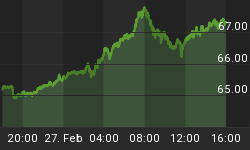Those rascals! While everyone was focusing on whether Greece would exit the Euro in the near-term (there's little question they will exit the Euro eventually), over the weekend German Chancellor Merkel and German Finance Minister Schaeuble urged Spain to request a bailout so that it can reinforce the condition of its banks.
Now, we all knew that was probably coming eventually as well, but last week there had been data showing that deposits have been moved out of Spanish banks in recent weeks and so European policymakers are rightly concerned about a full-scale bank run in the absence of credible (that is, not backed by insolvent sovereign entities but by cash in a fund) deposit insurance on the Continent.
So add Spain to the "To-Do" list, and also to the list of potential arguments. While Germany suggested Spain look for help, Merkel also made clear, again, that Germany will not stand for Eurobonds. Some people seem to think that Merkel is just bluffing. For example, the Wall Street Journal ran a curious article entitled "Germany Signals Crisis Shift" which suggested that "Germany is sending strong signals that it would eventually be willing to lift its objections to ideas such as common euro-zone bonds or mutual support for European banks if other European governments were to agree to transfer further powers to [a central authority in] Europe." I don't see anything in what Merkel said, or what her spokesman later clarified, that suggests Merkel would support Eurobonds in almost any set of circumstances - or, at least, relevant circumstances, meaning something that might actually be useful in this crisis over the next year or two.
Merkel is not bluffing. I know this because there is no point in bluffing if you are sure you will be called anyway; in fact, the only reason to bluff is if there is a chance that you will not be called. There is certainly no chance that Merkel saying she's opposed to Eurobonds will kill the desire in other quarters to have Eurobonds, so I can't imagine she is trying to defuse that discussion by bluffing but will later cave in. She's believes in her position, and Eurobonds are dead-on-arrival.
Also kicking around is the idea of a "banking union," which essentially means that all of the drowning people will embrace and agree to help one another. Spain cannot bail out her own banks because she cannot print money to do so (that was what she tried to do by issuing bonds to Bankia that would be discounted at the ECB in exchange for cash) and doesn't have enough assets or revenue to do so otherwise. So the idea of a banking union is that all banks would be part of a single network backstopped by Europe. Since that means in the current instance that Germany would have to bail out Spanish banks, and since there are no mechanisms in place to do this in any event, we can also put this idea to one side. It's an idea for the distant future, one in which Europe survives as a single institution. It doesn't help in 2012 or 2013, and the reason it is being discussed can only be because authorities think, or hope, that talk along these lines will improve depositor and consumer confidence. Good luck with that.
Stocks had sagged in the U.S. for most of the day, coming ever closer to wiping out 2012 gains for the S&P, when a story came out saying that the G7 will hold "emergency Euro Zone talks tomorrow." This top-secret meeting was leaked because, again, policymakers are trying to get the nail hammered down without actually having to use a hammer. It won't work, and so one hopes that the meeting will end with some useful pronouncement. Perhaps a pledge of a coordinated reduction in global swap line rates, or global LTRO, would get a brief pop out of markets. But I doubt it will calm things enough.
The problem is that the big elephant investors are moving, and/or have already gone through the trouble to have changed their country allocations and investing approach. That's not hot money. That's not a flow that will reverse overnight. Institutional investors have developed serious and reasonable concerns about the investing climate in Europe, and there will have to be a convincing end to the crisis - or prices low enough that the crisis is fully discounted - before these investors will come back. Investors in motion tend to stay in motion, while investors at rest tend to remain at rest. The inertia has been overcome, I think, so the time for bold-sounding meetings with no concrete results is over. Pops on news such as that will likely be increasingly short-lived.















